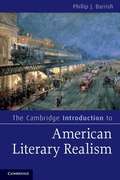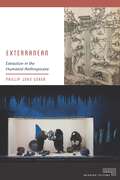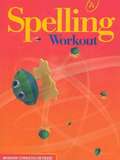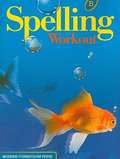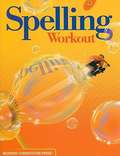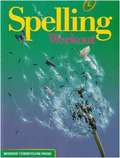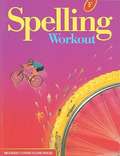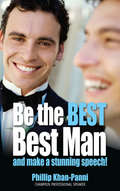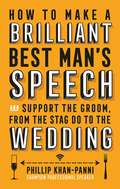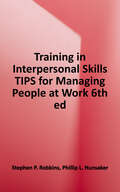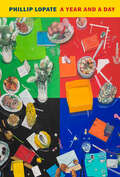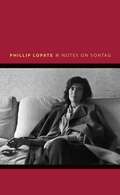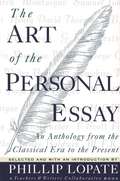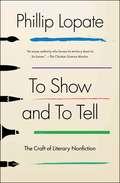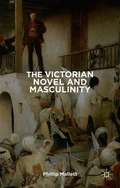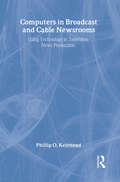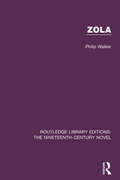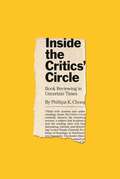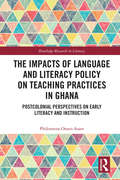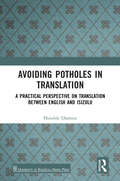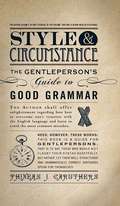- Table View
- List View
The Cambridge Introduction to American Literary Realism
by Phillip J. BarrishBetween the Civil War and the First World War, realism was the most prominent form of American fiction. Realist writers of the period include some of America's greatest, such as Henry James, Edith Wharton and Mark Twain, but also many lesser-known writers whose work still speaks to us today, for instance Charles Chesnutt, Zitkala-Ša and Sarah Orne Jewett. Emphasizing realism's historical context, this introduction traces the genre's relationship with powerful, often violent, social conflicts involving race, gender, class and national origin. It also examines how the realist style was created; the necessarily ambiguous relationship between realism produced on the page and reality outside the book; and the different, often contradictory, forms 'realism' took in literary works by different authors. The most accessible yet sophisticated account of American literary realism currently available, this volume will be of great value to students, teachers and readers of the American novel.
Exterranean: Extraction in the Humanist Anthropocene (Meaning Systems)
by Phillip John UsherExterranean concerns the extraction of stuff from the Earth, a process in which matter goes from being sub- to exterranean. By opening up a rich archive of nonmodern texts and images from across Europe, this work offers a bracing riposte to several critical trends in ecological thought. By shifting emphasis from emission to extraction, Usher reorients our perspective away from Earthrise-like globes and shows what is gained by opening the planet to depths within. The book thus maps the material and immaterial connections between the Earth from which we extract, the human and nonhuman agents of extraction, and the extracted matter with which we live daily.Eschewing the self-congratulatory claims of posthumanism, Usher instead elaborates a productive tension between the materially-situated homo of nonmodern humanism and the abstract and aggregated anthropos of the Anthropocene. In dialogue with Michel Serres, Bruno Latour, and other interdisciplinary work in the environmental humanities, Usher shows what premodern material can offer to contemporary theory. Examining textual and visual culture alike, Usher explores works by Ronsard, Montaigne, and Rabelais, early scientific works by Paracelsus and others, as well as objects, engravings, buildings, and the Salt Mines of Wieliczka. Both historicist and speculative in approach, Exterranean lays the groundwork for a comparative ecocriticism that reaches across and untranslates theoretical affordances between periods and languages.
Spelling Workout Level G
by Phillip K. TrockiSpelling Workout program ensures that the child will not only learn letters, words and their meanings, but that he or she will stay engaged during the education process.
Spelling Workout: Level A
by Phillip K. TrockiA workbook for children to learn how to spell English words.
Spelling Workout: Level B
by Phillip K. TrockiA workbook for children to learn how to spell English words.
Spelling Workout: Level D
by Phillip K. TrockiA workbook for children to learn how to spell English words.
Spelling Workout: Level E
by Phillip K. TrockiA workbook for children to learn how to spell English words.
Spelling Workout: Level F
by Phillip K. TrockiA workbook for children to learn how to spell English words.
Be the Best, Best Man & Make a Stunning Speech!
by Phillip Khan-PanniThe focus of this book is on that brief but terrifying prospect: the Best Man's speech. The book includes techniques for using stories, jokes and quotations that will lift your speech well above the bare necessities, helping you not only to make the speech, but also to enjoy it. More than just a guide to the Best Man's speech, this book is a one-stop guide to being a really effective, all round, Best Man. Above all its purpose is to help you enjoy your role as Best Man and to make it an occasion that honours the groom and his chosen bride.Contents: 1. Your complete guide to being best man 2. Myths and legends 3. Duties of the best man 4. Planning your speech 5. Preparation 6. Writing the speech in eight steps 7. Things to avoid 8. The big day 9. Delivery 10. Anecdotes 11. Jokes and quotes 12. Traditional and celebrity sayings 13. Sample toasts - beginnings, middles and endings 14. Mixed marriages Sample speeches
Be the Best, Best Man and Make a Stunning Speech!
by Phillip Khan-PanniThe focus of this book is on that brief but terrifying prospect: the Best Man's speech. <P><P>The book includes techniques for using stories, jokes and quotations that will lift your speech well above the bare necessities, helping you not only to make the speech, but also to enjoy it. More than just a guide to the Best Man's speech, this book is a one-stop guide to being a really effective, all round, Best Man. <P>Above all its purpose is to help you enjoy your role as Best Man and to make it an occasion that honours the groom and his chosen bride.
How To Make a Brilliant Best Man's Speech: and support the groom, from the stag do to the wedding
by Phillip Khan-PanniHow to make a great, best man's speech - and a guide to being a great best man.In this book Phillip Khan-Panni uses his expertise as a champion professional speaker to help the best man with the terrifying prospect of writing and delivering The Speech.He guides you on the vital preparation of your speech and tells you how to use stories, jokes and quotations that will lift it well above the bare necessities. With the author`s help and his professional tips and techniques, you will be able to make a really entertaining and moving speech that will be remembered for a long time to come. You might even enjoy making it as much as the guests do hearing it!There are also checklists and further advice to help you organise the whole occasion so that the big day honours the groom and his bride and thoroughly impresses their friends and relations
How To Make a Brilliant Best Man's Speech: and support the groom, from the stag do to the wedding
by Phillip Khan-PanniHow to make a great, best man's speech - and a guide to being a great best man.In this book Phillip Khan-Panni uses his expertise as a champion professional speaker to help the best man with the terrifying prospect of writing and delivering The Speech.He guides you on the vital preparation of your speech and tells you how to use stories, jokes and quotations that will lift it well above the bare necessities. With the author`s help and his professional tips and techniques, you will be able to make a really entertaining and moving speech that will be remembered for a long time to come. You might even enjoy making it as much as the guests do hearing it!There are also checklists and further advice to help you organise the whole occasion so that the big day honours the groom and his bride and thoroughly impresses their friends and relations
Training in Interpersonal Skills: Tips for Managing People at Work
by Stephen P. Robbins Phillip L. HunsakerAn applied approach to developing and practicing interpersonal skills. By developing and practicing the material in Training in Interpersonal Skills, readers can learn how to build productive relationships in any situation. This text also helps readers master the skills necessary for personal and organizational effectiveness such as self-management, communication, teaming, and problem-solving. The sixth edition includes several new pedagogical tools such as self-assessment quizzes, exercises, cases, etc.-and information on the importance and usage of social networking.
A Year and a Day: An Experiment in Essays
by Phillip LopateA compelling celebration of the power of the essay, this collection of 47 writings offers a glimpse into the mind of a modern-day Montaigne as he reflects on the miscellany of daily life—movies and art, friends and family—over the course of a single year.The essay is the most pluckily pedestrian and blithely transgressive of literary genres, the one that is most at large and in need, picking through the accumulated disjecta of daily life and personal and social history to take what it needs and remake it as it sees fit. It is, at its lively best, quite indifferent to the claims of style, fashion, theory, and respectability, provoking and inspiring through the pleasure of surprise. In 2016, Philip Lopate, who has been writing essays and thinking about the essay for decades now, turned his attention to one of the essay's offshoots, the blog, a form by that time already thick, as he knew, with virtual dust. Lopate committed to writing a weekly blog about, really, whatever over the course of a year, a quicker pace of delivery than he'd ever undertaken and one that carried the risk of all too regularly falling short. What emerged was A Year and a Day, a collection of forty-seven essays best characterized as a single essay a year in the making, a virtuosic (if never showy) demonstration of the essay's range and reach, meandering, looping back, pressing reset, forging on. Lopate's topics along the way include family, James Baldwin, a trip to China, Agnes Martin, Abbas Kiarostami, the resistible rise of Donald Trump, death, desire, and the tribulations, small and large, of daily life. What results is at once a self-portrait, a picture of the times, and a splendid new elaboration of what the essay can be.
Notes on Sontag (Writers on Writers #2)
by Phillip LopateNotes on Sontag is a frank, witty, and entertaining reflection on the work, influence, and personality of one of the "foremost interpreters of . . . our recent contemporary moment." Adopting Sontag's favorite form, a set of brief essays or notes that circle around a topic from different perspectives, renowned essayist Phillip Lopate considers the achievements and limitations of his tantalizing, daunting subject through what is fundamentally a conversation between two writers. Reactions to Sontag tend to be polarized, but Lopate's account of Sontag's significance to him and to the culture over which she loomed is neither hagiography nor hatchet job. Despite admiring and being inspired by her essays, he admits a persistent ambivalence about Sontag. Lopate also describes the figure she cut in person through a series of wry personal anecdotes of his encounters with her over the years. Setting out from middle-class California to invent herself as a European-style intellectual, Sontag raised the bar of critical discourse and offered up a model of a freethinking, imaginative, and sensual woman. But while crediting her successes, Lopate also looks at how her taste for aphorism and the radical high ground led her into exaggerations that could do violence to her own common sense, and how her ambition to be seen primarily as a novelist made her undervalue her brilliant essays. Honest yet sympathetic, Lopate's engaging evaluation reveals a Sontag who was both an original and very much a person of her time.
The Art of the Personal Essay: An Anthology from the Classical Era to the Present
by Phillip LopateWide-ranging selection of essays historical and contemporary writers.
To Show and to Tell: The Craft of Literary Nonfiction
by Phillip LopateDistinguished author Phillip Lopate, editor of the celebrated anthology The Art of the Personal Essay, is universally acclaimed as "one of our best personal essayists" (Dallas Morning News). Here, combining more than forty years of lessons from his storied career as a writer and professor, he brings us this highly anticipated nuts-and-bolts guide to writing literary nonfiction. A phenomenal master class shaped by Lopate's informative, accessible tone and immense gift for storytelling, To Show and To Tell reads like a long walk with a favorite professor--refreshing, insightful, and encouraging in often unexpected ways.FAs. An award-winning essayist and author himself, Lopate brings vividly into focus the true lifeblood of writing: exploration of one's innermost thoughts, feelings, and perceptions, and the art of thinking, engagingly, on the page. With his guidance, writers in every field and at every stage of their careers are certain to learn a thing or two.
The Victorian Novel and Masculinity
by Phillip MallettWhat did it mean, in the rapidly changing world of Victorian England, to 'be a man'? In essays written specially for this volume, nine distinguished scholars from Britain and the USA show how Victorian novelists from the Brontës to Conrad sought to discover what made men, what broke them, and what restored them.
Thomas Hardy in Context
by Phillip MallettThis collection covers the range of Thomas Hardy's works and their social and intellectual contexts, providing a comprehensive introduction to Hardy's life and times. Featuring short, lively contributions from forty-four international scholars, the volume explores the processes by which Hardy the man became Hardy the published writer; the changing critical responses to his work; his response to the social and political challenges of his time; his engagement with contemporary intellectual debate; and his legacy in the twentieth century and after. Emphasising the subtle and ongoing interaction between Hardy's life, his creative achievement and the unique historical moment, the collection also examines Hardy's relationship to such issues as class, education, folklore, archaeology and anthropology, evolution, marriage and masculinity, empire and the arts. A valuable contextual reference for scholars of Victorian and modernist literature, the collection will also prove accessible for the general reader of Hardy.
Computers in Broadcast and Cable Newsrooms: Using Technology in Television News Production (Routledge Communication Series)
by Phillip O. KeirsteadComputers in Broadcast and Cable Newsrooms: Using Technology in Television News Production takes readers through the use of computers and software in the broadcast/cable newsroom environment. Author Phillip O. Keirstead began writing about television news technology decades ago in an effort to help television news managers cope with technological change. In this text, he demonstrates the myriad ways in which today's journalism is tied to technology, and he shows how television news journalists rely on varied and complex technologies to produce timely, interesting, and informative broadcasts. Using a hands-on, practical approach to cover the role computers play in various parts of the newsroom, the volume will be of great practical value to undergraduate and graduate students in advanced broadcast/news television courses.
Zola (Routledge Library Editions: The Nineteenth-Century Novel #38)
by Phillip WalkerIn the novels of Emile Zola, the pain and horror of working class life was pushed into the drawing rooms of polite society. Zola set out to shock and to question the assumptions of fiction and of comfortable, settled lives. The impact of his writing was far wider than France, and his attacks on the pillars of society gave him an international reputation. First published in 1985, this biography of Zola does much more than simply describe Zola as a writer, and his literary impact. It brings together the many strands of Zola’s life and creates an impression of a remarkable, if often exasperating individualist. This book will be of interest to those studying the works of Emile Zola and more broadly nineteenth-century and French literature.
Inside the Critics’ Circle: Book Reviewing in Uncertain Times (Princeton Studies in Cultural Sociology #81)
by Phillipa K. ChongAn inside look at the politics of book reviewing, from the assignment and writing of reviews to why critics think we should listen to what they have to sayTaking readers behind the scenes in the world of fiction reviewing, Inside the Critics’ Circle explores the ways that critics evaluate books despite the inherent subjectivity involved, and the uncertainties of reviewing when seemingly anyone can be a reviewer. Drawing on interviews with critics from such venues as the New York Times, Los Angeles Times, and Washington Post, Phillipa Chong delves into the complexities of the review-writing process, including the considerations, values, and cultural and personal anxieties that shape what critics do.Chong explores how critics are paired with review assignments, why they accept these time-consuming projects, how they view their own qualifications for reviewing certain books, and the criteria they employ when making literary judgments. She discovers that while their readers are of concern to reviewers, they are especially worried about authors on the receiving end of reviews. As these are most likely peers who will be returning similar favors in the future, critics’ fears and frustrations factor into their willingness or reluctance to write negative reviews.At a time when traditional review opportunities are dwindling while other forms of reviewing thrive, book reviewing as a professional practice is being brought into question. Inside the Critics’ Circle offers readers a revealing look into critics’ responses to these massive transitions and how, through their efforts, literary values get made.
The Impacts of Language and Literacy Policy on Teaching Practices in Ghana: Postcolonial Perspectives on Early Literacy and Instruction (Routledge Research in Literacy)
by Philomena Osseo-AsareThis text critically examines changes in Ghanaian language and literacy policy following independence in 1957 to consider its impacts on early literacy teaching. By adopting a postcolonial theoretical perspective, the text interrogates the logic behind policy changes which have prioritised English, local language, or biliteracy. It draws on data from interviews with teachers and researcher observation to demonstrate how policies have influenced teaching and learning. Dr Osseo-Asare’s findings inform the development of a conceptual framework which highlights the socio-cultural factors that impact the literacy and biliteracy of young children in Ghana, offering solutions to help teachers combat the challenges of frequent policy changes. This timely monograph will prove to be an essential resource not only for researchers working on education policies, teacher education, and English-language learning in postcolonial Ghana but also for those looking to identify the thematic and methodological nuances of studying literacy and education in postcolonial contexts.
Avoiding Potholes in Translation: A Practical Perspective on Translation between English and isiZulu
by Phindile DlaminiThis book is a comprehensive introduction to translation studies between English and isiZulu. It incorporates crucial concepts for understanding the basics of translation within a South African language context and lays a foundation for further studies in translation. The book's content coverage, while broad, is also in-depth, and it skillfully integrates examples from varied types of texts. The practical and accessible style makes it both engaging and informative. The diverse examples illustrate not only the technicalities of translation as a process, but the vivid dynamics brought about by the fact that the languages involved in the translation process belong to different language families. The use of these examples for almost every aspect of translation explained makes this book unique and valuable to translation scholars and practitioners alike. Even though the book uses cases from the isiZulu language, it is an applicable reference for translation scholars and practitioners working with different indigenous languages of South Africa. Print edition not for sale in Sub Saharan Africa.
Style & Circumstance: The Gentleperson's Guide to Good Grammar
by Phineas J CaruthersStressed over syntax? Unsure about noun/verb agreement? Afraid to commit a grammatical faux pas? Fear not, dear reader. You have found yourself the perfect guide to proper grammar and style. This refresher on the modern rules of writing will help you regain your masterful grip of the English language.With plenty of instruction as well as a little pomp, this book entertains as it enlightens, making your reading experience enjoyable and your knowledge sound.
